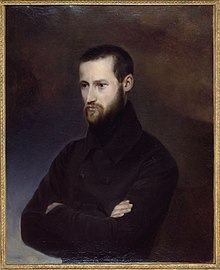Auguste Blanqui
| Louis Auguste Blanqui | |
|---|---|
 |
|
| Born |
February 8, 1805 Puget-Théniers, France |
| Died | January 1, 1881 (aged 75) |
| Nationality | French |
| Occupation | Revolutionary, Philosopher |
| Known for | Blanquism |
| Parent(s) |
|
| Relatives | Jérôme-Adolphe Blanqui |
Louis Auguste Blanqui (French pronunciation: [lwi oɡyst blɑ̃ki]; 8 February 1805, in Puget-Théniers, Alpes-Maritimes – 1 January 1881, in Paris) was a French socialist and political activist, notable for his revolutionary theory of Blanquism.
Blanqui was born in Puget-Théniers, Alpes-Maritimes, where his father, Jean Dominique Blanqui, of Italian descent, was subprefect. He was the younger brother of the liberal economist Jérôme-Adolphe Blanqui. He studied both law and medicine, but found his real vocation in politics, and quickly became a champion of the most advanced opinions. A member of the Carbonari society since 1824, he took an active part in most republican conspiracies during this period. In 1827, under the reign of Charles X (1824–1830), he participated in a street fight in Rue Saint-Denis, during which he was seriously injured. In 1829, he joined Pierre Leroux's Globe newspaper before taking part in the July Revolution of 1830. He then joined the Amis du Peuple ("Friends of the People") society, where he made acquaintances with Philippe Buonarroti, Raspail, and Armand Barbès. He was condemned to repeated terms of imprisonment for maintaining the doctrine of republicanism during the reign of Louis Philippe (1830–1848). In May 1839, a Blanquist inspired uprising took place in Paris, in which the League of the Just, forerunners of Karl Marx's Communist League, participated.
...
Wikipedia
